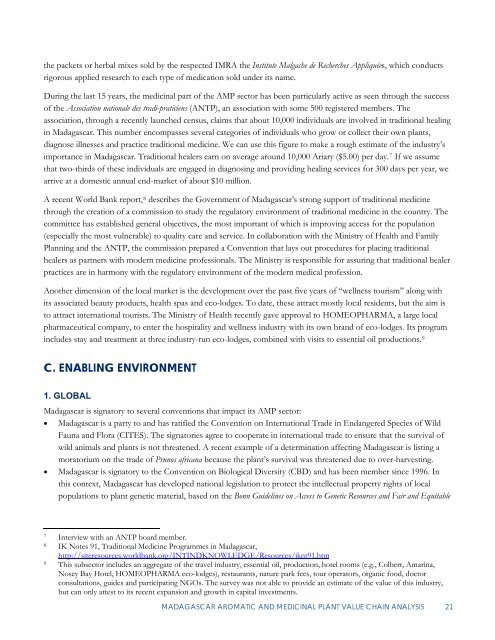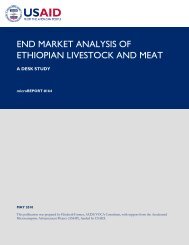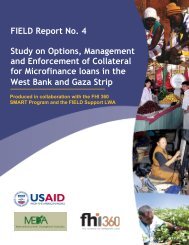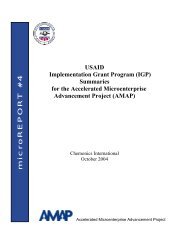Madagascar Aromatic and Medicinal Plants Value - Microlinks
Madagascar Aromatic and Medicinal Plants Value - Microlinks
Madagascar Aromatic and Medicinal Plants Value - Microlinks
Create successful ePaper yourself
Turn your PDF publications into a flip-book with our unique Google optimized e-Paper software.
the packets or herbal mixes sold by the respected IMRA the Institute Malgache de Recherches Appliquées, which conducts<br />
rigorous applied research to each type of medication sold under its name.<br />
During the last 15 years, the medicinal part of the AMP sector has been particularly active as seen through the success<br />
of the Association nationale des tradi-praticiens (ANTP), an association with some 500 registered members. The<br />
association, through a recently launched census, claims that about 10,000 individuals are involved in traditional healing<br />
in <strong>Madagascar</strong>. This number encompasses several categories of individuals who grow or collect their own plants,<br />
diagnose illnesses <strong>and</strong> practice traditional medicine. We can use this figure to make a rough estimate of the industry’s<br />
importance in <strong>Madagascar</strong>. Traditional healers earn on average around 10,000 Ariary ($5.00) per day. 7 If we assume<br />
that two-thirds of these individuals are engaged in diagnosing <strong>and</strong> providing healing services for 300 days per year, we<br />
arrive at a domestic annual end-market of about $10 million.<br />
A recent World Bank report, 8 describes the Government of <strong>Madagascar</strong>’s strong support of traditional medicine<br />
through the creation of a commission to study the regulatory environment of traditional medicine in the country. The<br />
committee has established general objectives, the most important of which is improving access for the population<br />
(especially the most vulnerable) to quality care <strong>and</strong> service. In collaboration with the Ministry of Health <strong>and</strong> Family<br />
Planning <strong>and</strong> the ANTP, the commission prepared a Convention that lays out procedures for placing traditional<br />
healers as partners with modern medicine professionals. The Ministry is responsible for assuring that traditional healer<br />
practices are in harmony with the regulatory environment of the modern medical profession.<br />
Another dimension of the local market is the development over the past five years of “wellness tourism” along with<br />
its associated beauty products, health spas <strong>and</strong> eco-lodges. To date, these attract mostly local residents, but the aim is<br />
to attract international tourists. The Ministry of Health recently gave approval to HOMEOPHARMA, a large local<br />
pharmaceutical company, to enter the hospitality <strong>and</strong> wellness industry with its own br<strong>and</strong> of eco-lodges. Its program<br />
includes stay <strong>and</strong> treatment at three industry-run eco-lodges, combined with visits to essential oil productions. 9<br />
C. ENABLING ENVIRONMENT<br />
1. GLOBAL<br />
<strong>Madagascar</strong> is signatory to several conventions that impact its AMP sector:<br />
• <strong>Madagascar</strong> is a party to <strong>and</strong> has ratified the Convention on International Trade in Endangered Species of Wild<br />
Fauna <strong>and</strong> Flora (CITES). The signatories agree to cooperate in international trade to ensure that the survival of<br />
wild animals <strong>and</strong> plants is not threatened. A recent example of a determination affecting <strong>Madagascar</strong> is listing a<br />
moratorium on the trade of Prunos africana because the plant’s survival was threatened due to over-harvesting.<br />
• <strong>Madagascar</strong> is signatory to the Convention on Biological Diversity (CBD) <strong>and</strong> has been member since 1996. In<br />
this context, <strong>Madagascar</strong> has developed national legislation to protect the intellectual property rights of local<br />
populations to plant genetic material, based on the Bonn Guidelines on Access to Genetic Resources <strong>and</strong> Fair <strong>and</strong> Equitable<br />
7 Interview with an ANTP board member.<br />
8 IK Notes 91, Traditional Medicine Programmes in <strong>Madagascar</strong>,<br />
http://siteresources.worldbank.org/INTINDKNOWLEDGE/Resources/iknt91.htm<br />
9 This subsector includes an aggregate of the travel industry, essential oil, production, hotel rooms (e.g., Colbert, Amarina,<br />
Nosey Bay Hotel, HOMEOPHARMA eco-lodges), restaurants, nature park fees, tour operators, organic food, doctor<br />
consultations, guides <strong>and</strong> participating NGOs. The survey was not able to provide an estimate of the value of this industry,<br />
but can only attest to its recent expansion <strong>and</strong> growth in capital investments.<br />
MADAGASCAR AROMATIC AND MEDICINAL PLANT VALUE CHAIN ANALYSIS 21





